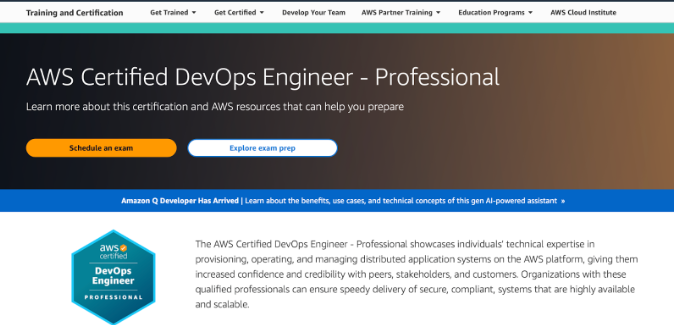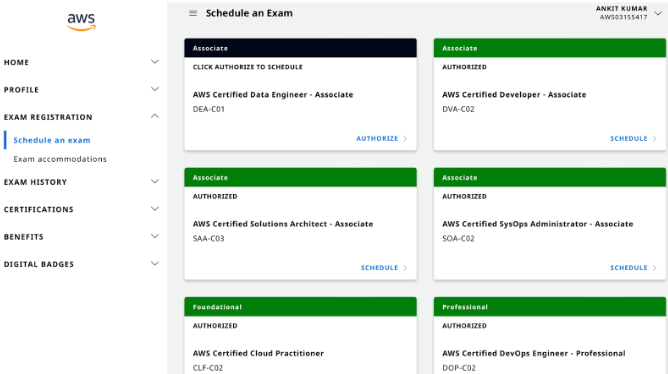AWS Certified DevOps Enginner Certification is one of the most trusted certifications for a career as a DevOps Engineer. if you are looking to start your career as a DevOps engineer. You will need to clear an assessment exam to be eligible for the certification.
Schedule an exam when your preparation is ready. This certification will build your portfolio and help you explore a range of opportunities. Let us learn how to get your AWS Certified DevOps engineer certification.
What is a DevOps engineer?
A DevOps Engineer is a professional who bridges the gap between development and operations teams within an organization. They play a crucial role in enhancing collaboration and productivity by automating and streamlining the integration and deployment processes, ensuring efficient and reliable software delivery.
A DevOps engineer is integral to modern software development and operations, focusing on automation, continuous integration, and continuous deployment to enhance collaboration and efficiency within an organization.
Key Takeaways:
- DevOps bridges the gap between development and operations teams to make SDLC processes and enhances collaboration and productivity.
- You can schedule for the DevOps Certification exam which is conducted by AWS online.
- After clearing the exam you can download the online certification from your profile directly.
How to Schedule an AWS Certified DevOps Engineer Certification Exam?
You can schedule an AWS-certified devOps engineer certification anytime you want. Follow the steps given below to schedule your exam.
- Log in to your AWS account using your username/email address and password. If you do not already have an AWS account then sign up using your email address and set up your password.
- Now Click on Schedule an Exam on the homepage of AWS Amazon’s official website.

- Go through the required information page and read the requirements carefully. Tick the checkbox and provide your details like Name, Address, current position, etc.
- You must be 18 years of age to apply for the AWS certification exam.
- You can schedule an exam on your profile based on the profile you are interested in.

Steps on How to Avail AWS DevOps Engineer Certification
The steps required to obtain certified DevOps engineer certification are listed below in the detailed format:
1. Exam Requirements:
Professional certification is intended for individuals who perform a DevOps engineer role. It verifies technical knowledge of deploying, operating, and managing distributed application systems on the AWS platform.
|
Exam Requirements |
|
| Category | Details |
| Prerequisites | At least two years of expertise in setting up, running, and maintaining AWS infrastructures.
Experience creating code in at least one high-level programming language. Experience building highly automated infrastructures. Experience administering operating systems. Recommended: AWS Certified Developer- Associate or AWS Certified SysOps Administrator- Associate certification. |
| Domains and Objectives | SDLC Automation (22%)
Configuration Management and Infrastructure as Code (19%) Monitoring and Logging (15%) Policies and Standards Automation (10%) Incident and Event Response (18%) High Availability, Fault Tolerance, and Disaster Recovery (16%) |
| Recommended Knowledge and Skills | Deep understanding of core AWS services.
Experience with automation tools like AWS CloudFormation and Terraform. Knowledge of CI/CD pipeline design and implementation. Understanding of security best practices in AWS. Experience with monitoring and logging tools like CloudWatch, ELK Stack, Prometheus, and Grafana. Strong problem-solving and troubleshooting skills. |
2. Preparation of the Exam
Professional certification requires both study and hands-on practice. In the case of AWS-certified DevOps Engineer certification, along with study and practice, familiarity with AWS services and best practices are also required. A comprehensive guide to help students find their path well is mentioned below:
| Preparation Guide | |
| Step | Details |
| Understand Exam Structure | Multiple-choice and multiple-response questions
Duration: 180 minutes |
| Review Exam Guide | Download the AWS Certified DevOps Engineer- Professional Exam Guide from the AWS Certification website |
| Study Resources | AWS Training: DevOps Engineering on AWS, Architecting on AWS, and Advanced Architecting on AWS
AWS Whitepapers and Documentation: CI/CD, microservices, serverless, security Books: The DevOps Handbook, AWS Certified DevOps Engineer Professional: The Definitive Guide |
| Hands-On Experience | Use AWS Free Tier for hands-on practice with services like EC2, S3, RDS, Lambda, CloudFormation, and CodePipeline
Engage in practical labs and projects on platforms like A Cloud Guru, Udemy, and Linux Academy |
| Practice Exams | AWS Official Practice Exams
Third-Party Practice Tests: Whizlabs, A Cloud Guru, and Udemy |
| Exam Preparation Tips | Create a study plan and stick to it
Focus on weak areas identified through practice tests Regularly review and revise notes |
| Schedule the Exam | Create an AWS Certification account
Schedule the exam through the AWS Training and Certification website |
| On Exam Day | Ensure good rest the night before
Arrive early at the testing center or prepare for an online proctored exam Read the questions attentively and utilize your time efficiently. |
3. Post Exam and Maintenance of Certificate
The table organizes steps into stages to easily follow the process for maintaining the AWS-certified DevOps engineer certification.
|
Post Exam and Certificate Maintenance |
||
| Stage | Steps | Description |
| Post-Exam Steps | 1. Receive Your Results | Receive the preliminary score immediately and the official score within five business days. |
| 2. Access Your Digital Badge | Get your digital badge via Credly’s Acclaim platform and share it. | |
| 3. Download Your Certificate | Download and print your certificate from your AWS Certification Account. | |
| 4. Update Your Resume and Professional Profiles | Add your certification to your resume, LinkedIn, and other professional networks. | |
| Maintaining Certification | 1. Understand the Recertification Requirements | Pass the current version of the AWS Certified DevOps Engineer- Professional exam or achieve a higher-level certification. |
| 2. Prepare for Recertification | Review the latest exam guide, use AWS training resources, and stay updated on AWS services. | |
| 3. Schedule and Take the Recertification Exam | Log in to your AWS Certification Account, schedule, and take the recertification exam. | |
| 4. Monitor Your Certification Status | AWS will send reminders; and plan recertification in advance to avoid lapses. | |
| Continuous Learning and Professional Development | 1. Stay Updated with AWS | Follow AWS news, and updates, and participate in AWS events. |
| 2. Gain Hands-On Experience | Continuously use AWS services and experiment with new features. | |
| 3. Engage with the Community | Join forums, participate in meetups, and engage with the AWS community. | |
| 4. Take Additional AWS Certifications | Pursue other AWS certifications to broaden expertise and demonstrate continuous learning. | |
Online Courses for AWS-certified DevOps Engineers
Some of the courses provide a variety of learning formats, including video lectures, hands-on labs, quizzes, and practice exams, to help in preparing for the AWS-certified DevOps engineer certificate.
|
Online Courses |
||
| Platform | Course | Description |
| AWS Training | DevOps Engineering on AWS | Official AWS training covering DevOps principles and best practices. |
| PW Skills | DevOps and Cloud Computing Training Program | 6 month Training program in DevOps |
| Udemy | AWS Certified DevOps Engineer Professional 2026 – Hands-On! | Comprehensive course with hands-on labs and practice exams. |
| AWS Certified DevOps Engineer – Professional 2026 | Another popular Udemy course focuses on real-world scenarios and exam preparation. | |
| A Cloud Guru | AWS Certified DevOps Engineer – Professional | Extensive course with labs, quizzes, and practice exams. |
| Linux Academy | AWS Certified DevOps Engineer Professional | In-depth course with hands-on labs and detailed explanations. |
| Pluralsight | AWS Certified DevOps Engineer – Professional (DOP-C01) | Series of courses covering all exam domains with hands-on labs. |
| Coursera | AWS Fundamentals: DevOps | Course offered by AWS on Coursera, focusing on DevOps fundamentals and best practices. |
| Whizlabs | AWS Certified DevOps Engineer Professional Online Course | Training course with video lectures, hands-on labs, and practice exams. |
| LinkedIn Learning | Learning Path: Become a Cloud DevOps Engineer | Series of courses to build DevOps skills with a focus on AWS services. |
| Simplilearn | AWS DevOps Certification Training | Training program with live classes, labs, and practice exams. |
Prepare for AWS Certified DevOps Engineer Certification with PW Skills
Join our online DevOps certification program and build strong basics in DevOps and cloud computing technology. Prepare for your AWS certification exam with industry experts. Get in-depth learning through interactive classes, regular assessments, practice exercises, and work on industry-relevant projects throughout the course only at pwskills.com
AWS Certified DevOps Engineer Certification FAQs
Q1. What is AWS Certified DevOps Engineer Certification?
Ans: A DevOps Engineer is a professional who bridges the gap between development and operations teams within an organization.
Q2. What do you need for AWS Certified DevOps Engineer Certification?
Ans: You need to have two or more years of experience working in an AWS environment with knowledge of at least one high programming language. You will need to clear the AWS certification exam to get your AWS certification.
Q3. Is DevOps Engineer Certification worth it?
Ans: DevOps is a dynamic field providing a high range of opportunities and high salaries working in the software development field. You will be able to build knowledge of advanced tools and technologies and build strong experience through practical experience.
Q4. Is coding mandatory for AWS DevOps Engineers?
Ans: No, coding is not mandatory for DevOps engineers. As a devOps engineer, you will be responsible for deploying, automating, and managing cloud-based software systems.


